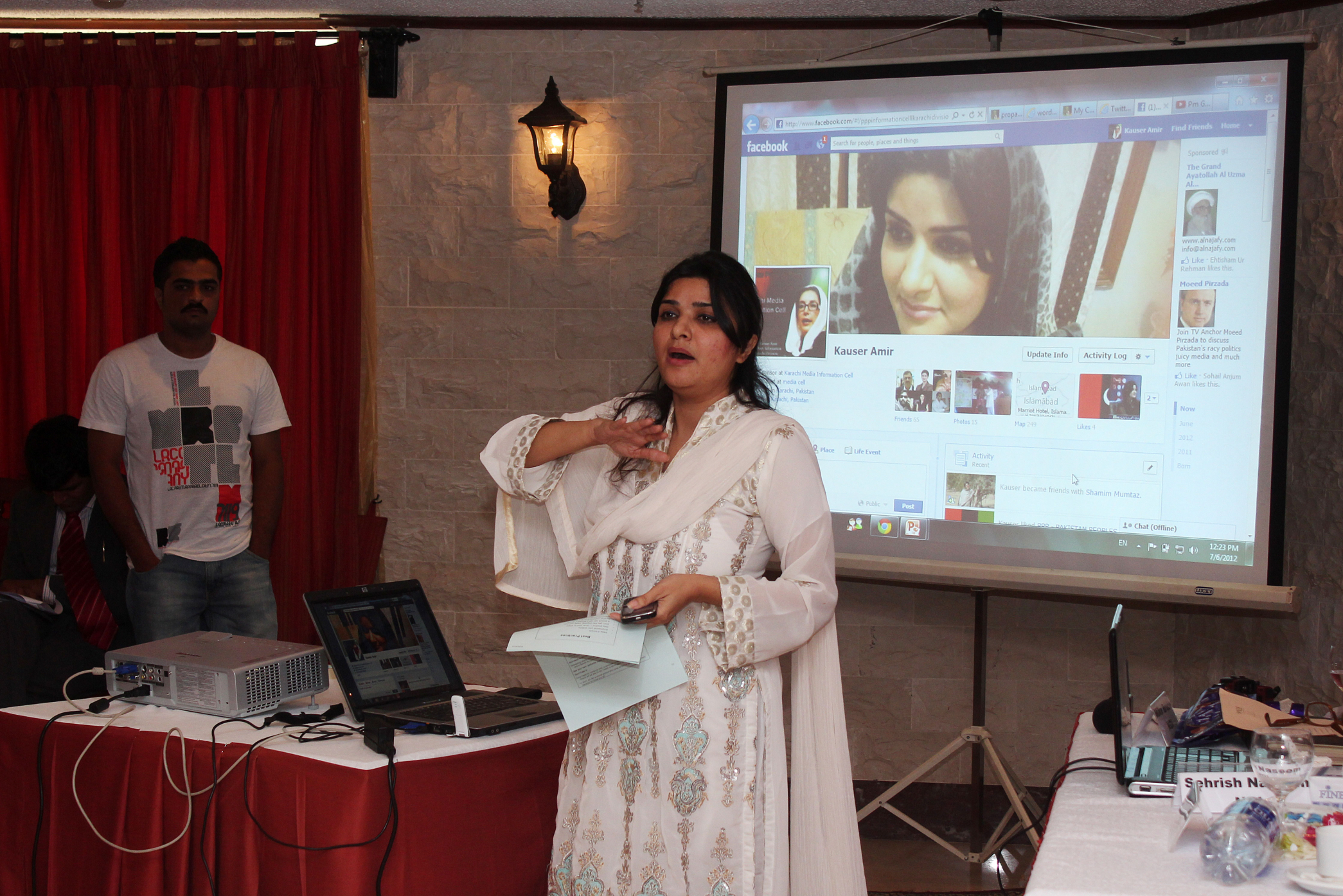NDI Pakistan multi-party training fellowship program participants prepare to present proposed political party training initiatives
SHARE
Pakistan’s political parties are increasingly turning to social media to engage with the public on policy issues. Party activists from across the political spectrum produce original online content about pressing citizen concerns, using public opinion research to inform social media strategy and deploying new messaging and communication techniques to interact more effectively with citizens. Parties use these tools to develop more responsive policy proposals and create space for conversation and two-way exchange between citizens and party leaders.
An estimated 15 percent of the population (29 million of Pakistan’s estimated 190 million inhabitants) has Internet access. Social media penetration remains relatively low, but is growing rapidly. Social media platforms also remain disproportionately popular with younger voters, a key demographic. Pakistanis under the age of 35 make up 48 percent of registered voters and two-thirds of Facebook users are under 25.
While online policy advocacy is relatively new in Pakistan, political parties have been active on social media for years, particularly during election campaigns. During 2013 elections, political parties and candidates were actively using Facebook and Twitter accounts to publicize their campaigns. Political parties looking to connect with young voters have found that social media provides an excellent opportunity to connect quickly, consistently and at a very low cost.
Social Media has become an essential component of outreach strategy for political parties of all sizes in Pakistan. The Pakistan Muslim League-Nawaz (PML-N) political party (the current governing party in Pakistan), for example, has utilized social media to reach out to voters, announce news and get feedback on new policies. In August 2016, PML-N published a video on their Facebook page celebrating a meeting held by President Nawaz Sharif to praise the party’s social media workers and volunteers. As an indication of the party’s excitement about political engagement on social media, the video has been viewed nearly 500,000 times and received more than 2,700 comments.
As part of its mission to support the development and responsiveness of political parties around the world, NDI has supported Pakistan’s political parties in gaining fluency with social media tools and their application for citizen outreach and policy development processes.
Political party leaders practice video interviews as part of NDI Pakistan communication workshops. (Photo Credit: Ayesha Warsi)
Since 2011, NDI has partnered with the International Republican Institute (IRI) to provide policy development and comprehensive communications training to political parties in Pakistan through a program funded by the United States Agency for International Development (USAID). In workshops and consultations, members from all major political parties in Pakistan have learned about message development and delivery, public speaking and effective social media engagement.
NDI has worked in recent years with a wide range of political parties in Pakistan as part of this and other donor-funded programs: the Awami National Party (ANP), Jamaat-e-Islami (JI), Jamiat Ulema-e-Islam Fazl-ur-Rehman (JUI-F), Muttahida Quami Movement (MQM), National Party (NP), Pakistan Muslim League-Functional (PML-F), Pakistan Muslim League-Nawaz (PML-N), Pakistan Muslim League Quaid-e-Azam (PML), Pakistan People’s Party (PPP), Pakistan Tehreek-e-Insaf (PTI), Pashtoonkhwa Milli Awami Party (PMAP) and Qaumi Watan Party (QWP).
In March 2016, PML published a climate change policy video series, coinciding with World Water Day. The video series, titled Pighalta Pakistan (Melting Pakistan), has reached more than 850,000 viewers on Facebook. It highlights the risk global warming poses to Pakistan’s already-scarce water resources.
The video series grew out of an issue prioritized by in-person surveys with grassroots political party members and NDI-led issue identification workshops designed to facilitate an inclusive public policy development process. Its success shows the potential of this method, which began by engaging grassroots party members and grew to reach potential voters in the public at large.
Political party members present recommendations for new approaches to social media outreach while attending the NDI Pakistan multi-party training fellowship program.
Political parties in Pakistan are also taking steps to better understand their audiences and are tailoring social media content to target them. QWP, for example, conducted a survey on social media use and the Internet in one of the party’s key districts in the northwestern province of Khyber Pakhtunkhwa. To create a more informed social media strategy, party researchers asked participants about their daily Internet use, their preferred social media platforms, the types of information they rely on social media for and the information they would like to receive from political parties online.
To increase their online presence and encourage party activists to leverage social media for effective engagement, many Pakistani political parties have formalized social media action plans and codes of conduct. Participants have found the training beneficial for developing potent political messages and engaging with the public regarding citizen concerns and proposed policy responses. According to one participating party member, NDI and IRI workshops have helped the party “deliver party messages in an interesting way.”



